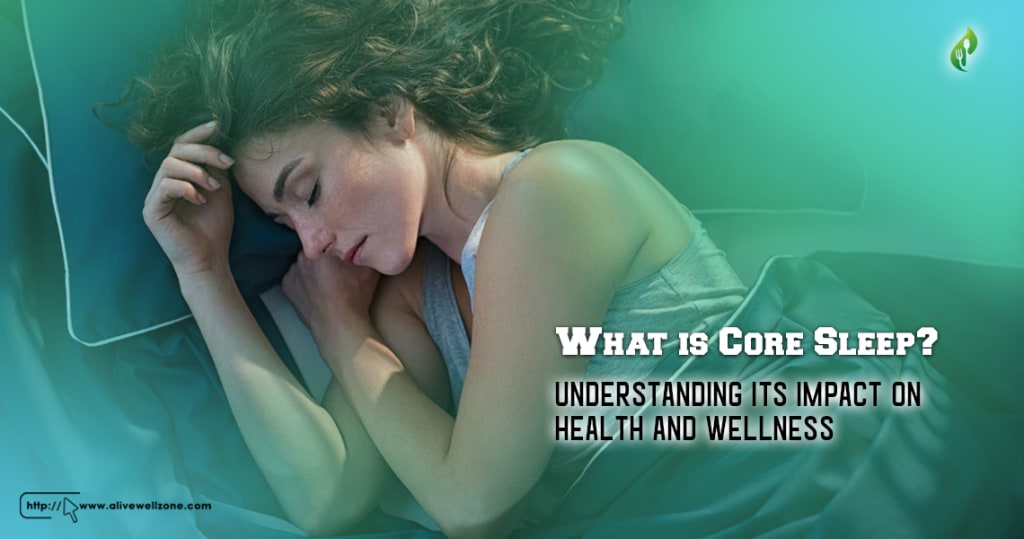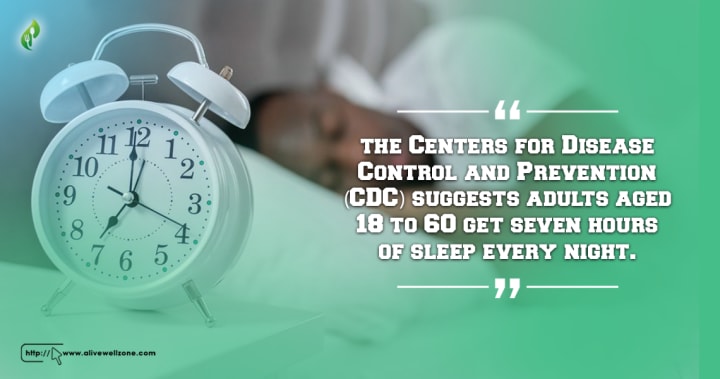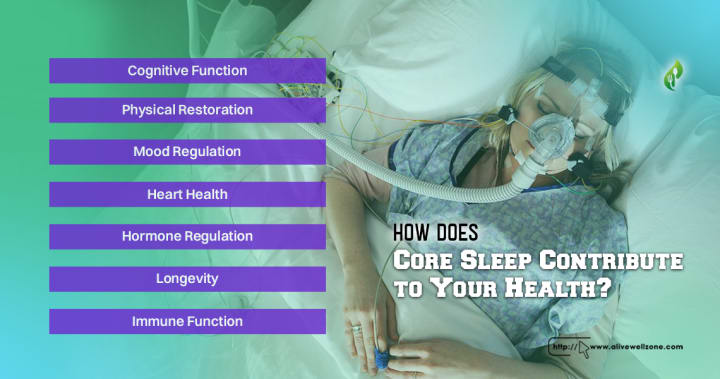
Are you constantly battling fatigue, brain fog, and a lack of energy despite getting enough sleep? If so, you might be experiencing the effects of inadequate core sleep. Often, we overlook this important aspect of our sleep cycle, which can have a profound effect on our health.
Core sleep encompasses stages such as Deep Sleep and REM, vital for physical restoration and memory consolidation. Adults require 7 to 9 hours, but stress and lifestyle can impact sleep quality. The quality of your core sleep affects your overall well-being.
Today, we'll explore what is core sleep, its importance, and practical strategies to enhance the quality of your core sleep. Understanding this key aspect of sleep unlocks the path to improved energy levels, sharper focus, and enhanced well-being.
What is Core Sleep?
Core sleep is the crucial sleep phase lasting 4 to 6 hours nightly, vital for brain function and health. It includes REM and N4 deep sleep stages, important for repairing tissues, solidifying memories, and balancing hormones.
What Are the Stages of Sleep?
During a night's rest, you cycle through four distinct sleep stages. These include three stages of non-rapid-eye-movement (NREM) sleep and one stage of rapid-eye-movement (REM) sleep. As you move through each of these stages, you complete what's known as a sleep cycle.
Typically, one cycle lasts between 70 to 120 minutes. Depending on how long you sleep, you'll go through four to six cycles each night. Let's break down what happens during a typical night's sleep —
Stage 1
This initial stage is quite brief, lasting just a few minutes as you start to fall asleep. It's a period of light sleep, meaning any loud noises can easily wake you up. Typically, you spend about 2% to 5% of your sleep time in this stage.
Stage 2
Next comes stage 2, another light sleep phase. Here, your breathing and heart rate start to slow down, and your brain activity decreases to a more regular pattern.
This stage kicks off with a duration of 10 to 25 minutes during the first cycle, extending as the night progresses. You'll find yourself in this stage for 45% to 55% of the night.
Stage 3 (Deep Sleep)
During stage 3, also called deep sleep, you'll notice your breathing and heart rate drop to their lowest level. Meanwhile, your brain begins to produce delta waves, a type of slow wave. This stage typically lasts between 20 to 40 minutes during your first sleep cycle but becomes shorter as the night goes on.
It's even possible not to enter deep sleep at all after your first couple of cycles. You'll spend about 10% to 25% of your sleep in this restorative phase.
Rapid Eye Movement (REM) Sleep
REM sleep is famous for being the time when you dream. During this stage, your eyes dart back and forth quickly under your eyelids, which is how it got its name. To prevent you from physically acting out your dreams, most of your muscles become temporarily paralyzed.
In the beginning, REM sleep might last for only one to five minutes, but each cycle extends this time a bit more. By the end of the night, you will have spent 20% to 25% of your sleep in the REM stage.
How Much Core Sleep Do You Need?
The amount of core sleep you need each night varies based on factors like your age, health, and lifestyle. It also depends on your understanding of what core sleep means.
Look, everyone's sleep needs are different. However, the Centers for Disease Control and Prevention (CDC) suggests adults aged 18 to 60 get seven hours of sleep every night.

In fact, you should spend about 45-50% of that sleep time in the deeper stages. The lighter stages, known as NREM1 and NREM2, make up the remainder of your sleep.
It's important to remember that your sleep patterns may shift as you get older. Adults, especially those over 65, tend to spend less time in deep sleep compared to younger people.
Factors like age, medical conditions, and lifestyle choices—including your exposure to light, when you eat, and your consumption of things like nicotine, alcohol, and caffeine—can all make your sleep lighter. Your activity levels and stress can also play a role.
How Does Core Sleep Contribute to Your Health?

Core sleep is vital for your health in several key areas —
Cognitive Function
Deep sleep is crucial for your brain to work its best. It helps with important tasks like storing memories, learning new things, solving problems, and making decisions. It also boosts creativity and keeps your mind clear.
Physical Restoration
When you're in deep sleep, your body repairs itself. This is when your muscles fix themselves from the day's wear and tear, your tissues mend, and your immune system gets stronger, all of which contribute to better physical health.
Mood Regulation
Getting enough deep sleep is important for feeling emotionally well. It keeps your mood steady by keeping the brain's chemicals in balance, cutting down on feelings of irritability, anxiety, and stress.
Heart Health
Studies show that not getting enough sleep increases your risk of heart disease, stroke, and high blood pressure. In fact, good sleep helps keep your heart healthy by keeping blood pressure in check and reducing the strain on your heart.
Speaking of heart, you better eat heart-healthy foods to improve your overall condition.
Hormone Regulation
Deep sleep keeps important hormones that control your appetite, metabolism, stress response, and growth in check. If your deep sleep is thrown off, it could mess with these hormones, possibly leading to weight gain, more stress, and other health problems.
Longevity
Getting enough good-quality deep sleep can help you live longer. Making sure you consistently get the right amount of sleep boosts your overall health and helps you live a longer life.
Immune Function
Deep sleep is key to a strong immune system. It helps make cytokines, which are proteins that fight off infections and inflammation, strengthening your body's ability to ward off sickness. Not only sleep, some foods can also improve your immune system and fight off.





Comments
AP07 is not accepting comments at the moment
Want to show your support? Send them a one-off tip.